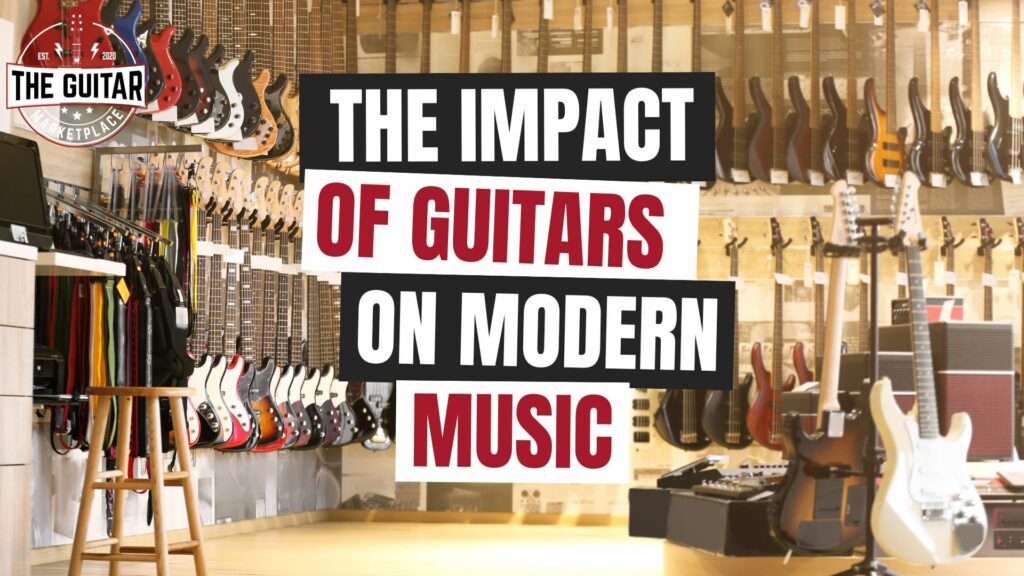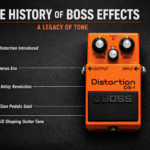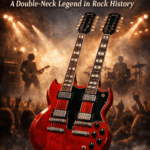The guitar, an instrument that needs no introduction, has left an indelible mark on modern music. From the rebellious chords of rock ‘n’ roll to the soulful lament of the blues, from the protest anthems of folk to the blistering guitar solos of classic rock, the guitar’s influence is omnipresent.
This blog, “The Impact of Guitar on Modern Music,” is a journey through time and genres, delving into how the guitar has shaped musical evolution. We’ll explore its vital role in the blues and its contribution to the counterculture movements of the 1960s. We’ll revisit the golden era of rock ‘n’ roll and venture into the uncharted territories of jazz, funk, and metal.
But it doesn’t stop there. The guitar’s enduring presence in contemporary pop and hip-hop, along with the innovations in technology, showcases its adaptability and continued relevance. In this exploration, we’ll witness how the guitar, a timeless icon, continues to inspire, define, and redefine the ever-evolving soundscape of modern music.

The Birth of Rock ‘n’ Roll
The birth of rock ‘n’ roll marked a seismic shift in the world of music, and the electric guitar was at the forefront of this revolution. Emerging in the mid-20th century, rock ‘n’ roll fused rhythm and blues, country, and gospel, creating a genre that was infectious, rebellious, and energetic. It was the electric guitar’s electrifying sound that became the heartbeat of this new musical movement.
Pioneers like Chuck Berry, with his electrifying guitar licks and charismatic stage presence, blazed the trail for rock ‘n’ roll. His iconic guitar work on tracks like “Johnny B. Goode” and “Maybellene” not only defined the genre but set the bar high for generations of guitarists to come.
Chuck Berry’s influence was far-reaching, laying the foundation for the guitar-driven rock music that would follow. The electric guitar, with its bold and electrifying sound, became synonymous with the youthful rebellion and free spirit that defined rock ‘n’ roll, ensuring that its impact would resonate through the decades to come.

The Guitar in the Blues
The blues, with its raw emotion and soul-stirring melodies, found its heart and soul in the guitar. This instrument played a pivotal role in the evolution of blues music, carrying the weight of sorrow, resilience, and redemption. Legendary blues guitarists like Robert Johnson and Muddy Waters etched their names in the annals of music history.
Robert Johnson, often shrouded in mystery, was a virtuoso of the Delta blues. His haunting, fingerpicked guitar style, coupled with his emotionally charged lyrics, laid the foundation for modern blues. Songs like “Cross Road Blues” and “Hellhound on My Trail” exemplify Johnson’s mastery of the instrument.
Muddy Waters, on the other hand, electrified the blues. With his slide guitar technique and a commanding stage presence, he transformed the sound of the genre. Waters’ electrified hits like “Rollin’ Stone” paved the way for the blues-rock explosion of the 1960s.
These blues legends, along with many others, breathed life into the guitar, making it the voice of an entire genre. The blues became a testament to the guitar’s power to convey the deepest of human emotions, ultimately influencing not only rock ‘n’ roll but an array of musical genres.
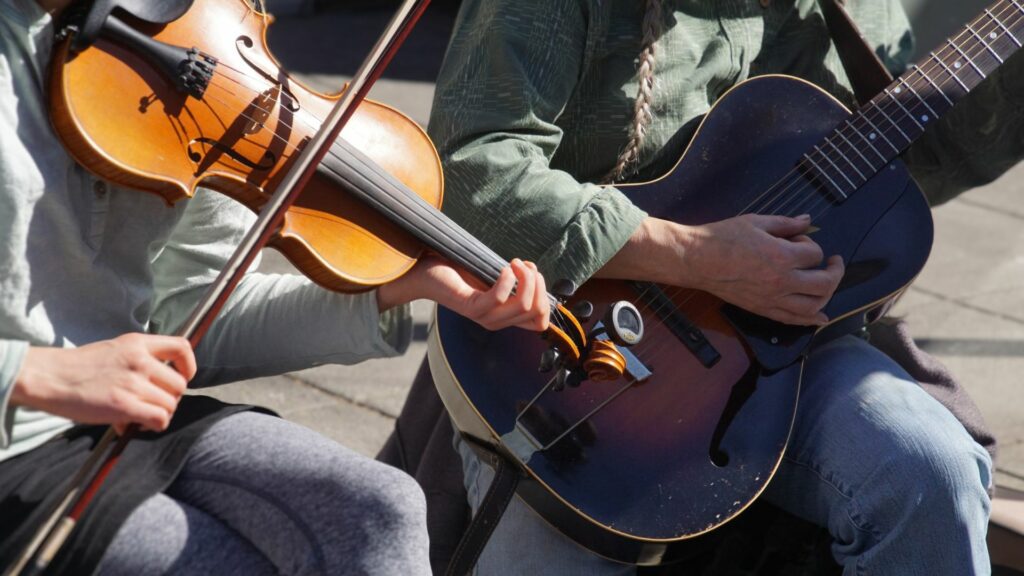
The Guitar & the Folk Revolution
The 1960s saw the resurgence of folk music, and at the heart of this revival was the acoustic guitar. It became the symbol of a generation’s desire for change and its vehicle for protest. Artists like Bob Dylan and Joan Baez wielded the guitar as a powerful tool in conveying their messages through music.
Bob Dylan, with his poetic lyricism and skillful guitar playing, emerged as the voice of a generation. Songs like “Blowin’ in the Wind” and “The Times They Are a-Changin'” used the acoustic guitar to address pressing social and political issues. The guitar was not just an instrument; it was a catalyst for change.
Similarly, Joan Baez’s ethereal voice and intricate fingerpicking style added another dimension to the folk revival. Her renditions of traditional folk songs and her original compositions, such as “Diamonds & Rust,” inspired social and political activism.
The acoustic guitar, intimately woven into the fabric of folk music, became a symbol of resistance and unity during a transformative era. It showcased the guitar’s power not only to entertain but to convey messages that could change the world, solidifying its status as an agent of social change.

The Golden Era of Guitar Solos
The golden era of guitar solos in rock music, spanning the late 1960s and 1970s, transformed the guitar into a sonic weapon of unparalleled expression. Guitar heroes like Jimi Hendrix and Eric Clapton led the charge, pushing the boundaries of what was possible with six strings and an amplifier.
Jimi Hendrix, often described as a virtuoso and an innovator, redefined the electric guitar solo. His iconic performances at Woodstock and the Monterey Pop Festival showcased his unrivaled skills. Tracks like “Purple Haze” and “Voodoo Child” became anthems of an era and set the standard for guitar solos.
Eric Clapton, often called “Slowhand,” was equally influential. His bluesy, emotive solos in songs like “Layla” and “Crossroads” captured the hearts of millions. Clapton’s masterful phrasing and technique made him a paragon of guitar solo artistry.
These guitar heroes, among others, transformed solos into the heart and soul of rock music. The guitar solo became a means of individual expression, a conduit for raw emotion, and a defining element of rock’s identity. It was during this golden era that the guitar’s power to move and inspire reached new heights.

The Versatility of the Guitar
The guitar’s versatility knows no bounds, and it effortlessly transitions across a diverse array of music genres. From the sultry melodies of jazz to the groovy rhythms of funk and the thundering riffs of metal, it has proved its mettle as the Swiss Army knife of instruments.
In jazz, the guitar’s smooth, velvety tones have been exemplified by virtuosos like Django Reinhardt and Wes Montgomery. Their intricate fingerpicking and chord progressions brought a new dimension to the genre.
Funk music, characterized by its infectious grooves, found a perfect companion in the guitar. Icons like Nile Rodgers, with his signature rhythm guitar work in Chic, and Jimi Hendrix’s funk-inspired tracks displayed the guitar’s adaptability.
The world of metal, known for its thunderous power chords and intricate solos, boasts guitar heroes like Eddie Van Halen and Tony Iommi, who reshaped the genre’s sonic landscape.
This exploration of versatility highlights the guitar’s chameleon-like ability to seamlessly fit into a wide range of musical genres, demonstrating that this instrument is not bound by any singular style but can flourish in all.

The Guitar in Contemporary Pop and Hip-Hop
In an era where electronic sounds often reign supreme, the guitar continues to assert its presence in contemporary music, bridging the analog and digital worlds. Artists like John Mayer and Ed Sheeran have been at the forefront of popularizing the acoustic guitar in modern pop music.
John Mayer’s soulful guitar work and heartfelt lyrics have earned him a special place in pop music. Hits like “Your Body Is a Wonderland” and “Gravity” showcase his guitar virtuosity and have helped redefine the pop landscape.
Ed Sheeran, armed with his acoustic guitar and loop pedal, has created chart-topping hits that revolve around his guitar-driven sound. Tracks like “Shape of You” and “Thinking Out Loud” have demonstrated the enduring appeal of the acoustic guitar in the pop genre.
In an age where technology dominates, the guitar’s resonance in contemporary pop and hip-hop serves as a testament to its timeless allure and its unique ability to infuse warmth and authenticity into even the most digitally-driven music.
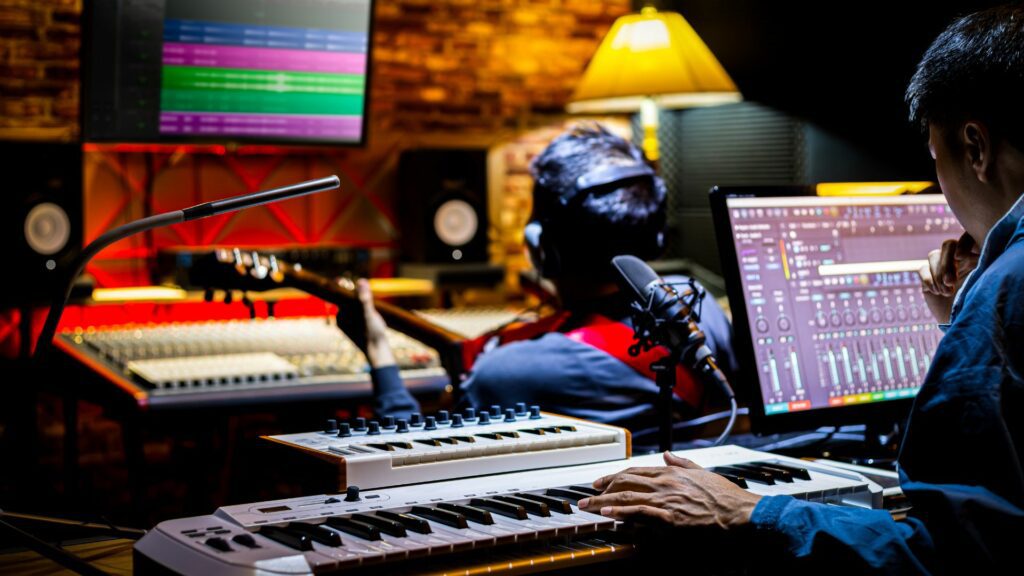
Innovation and Technology
The guitar’s evolution extends beyond its physical form; it’s a journey marked by technological innovation. Effects pedals, digital modeling, and advanced recording techniques have expanded the guitar’s sonic horizons, redefining what is possible with this timeless instrument.
Effects pedals have allowed guitarists to sculpt their sound in unprecedented ways. From the psychedelic wails of a wah-wah pedal to the ethereal ambience of reverb and delay, these devices have become an integral part of a guitarist’s arsenal. Artists like Jimi Hendrix and U2’s The Edge have harnessed the transformative power of effects pedals to create signature sounds.
Digital modeling technology has ushered in a new era of versatility. Guitarists can now replicate the tones of vintage amplifiers and experiment with a vast array of sounds with a single instrument. It has made the studio-to-stage transition smoother and expanded the possibilities for live performances.
In modern music production, the influence of guitar effects is undeniable. They’ve left an indelible mark on rock, pop, electronic, and experimental music, pushing the guitar’s boundaries while respecting its rich heritage. This fusion of tradition and innovation underscores the guitar’s enduring relevance in contemporary music.
Conclusion
The guitar’s impact on modern music is nothing short of extraordinary. From its birth in rock ‘n’ roll to its pivotal role in the blues, folk, and the golden era of guitar solos, it has left an indelible mark on musical history. Its versatility, witnessed in genres from jazz to folk to funk to metal, showcases its ability to seamlessly adapt to various musical landscapes.
The guitar’s journey doesn’t stop with its rich history. Even in contemporary pop and hip-hop, it remains a vital force, bridging the gap between analog and digital sounds. Artists like John Mayer and Ed Sheeran keep its flame burning, reminding us of its timeless allure.
But perhaps the most remarkable aspect is how innovation and technology have expanded its horizons. Effects pedals, digital modeling, and advanced recording techniques have taken the guitar into uncharted territory, making it a canvas for sonic experimentation.
The guitar’s story is one of enduring tradition and ceaseless innovation. It has shaped genres, moved hearts, and inspired countless musicians. As we look to the future, we see that its timeless resonance will continue to guide and inspire new generations, reminding us that the guitar’s journey is far from over.
The End… Or is it?
As we conclude our exploration of the guitar’s profound influence on modern music, we invite you to embark on your own musical journey or deepen your appreciation for this versatile instrument.
For those who have yet to pick up a guitar, now is the perfect time to start. Whether you’re drawn to the passionate solos of rock ‘n’ roll, the soulful blues, or the poetic folk melodies, the guitar can be your faithful companion. With an array of online tutorials and resources, you can begin your musical odyssey from the comfort of your home.
If you’re already a guitarist, consider expanding your horizons. Experiment with new genres, effects, and techniques. Push the boundaries of what your guitar can do, and let your creativity soar.
And for all music lovers, take a moment to truly appreciate the guitar’s enduring legacy. Listen to your favorite songs with fresh ears, paying attention to the intricate guitar work that often forms the emotional core of the music.
In the end, the guitar is an instrument of endless possibilities, a source of inspiration, and a conduit for self-expression. Whether you’re a beginner or a seasoned player, there’s always more to discover, more to create, and more to love in the world of music. So, let the guitar be your guide on this remarkable journey.
Want to win yourself a guitar for a fraction of its original price? Check out what’s on offer here!
-
Product on sale
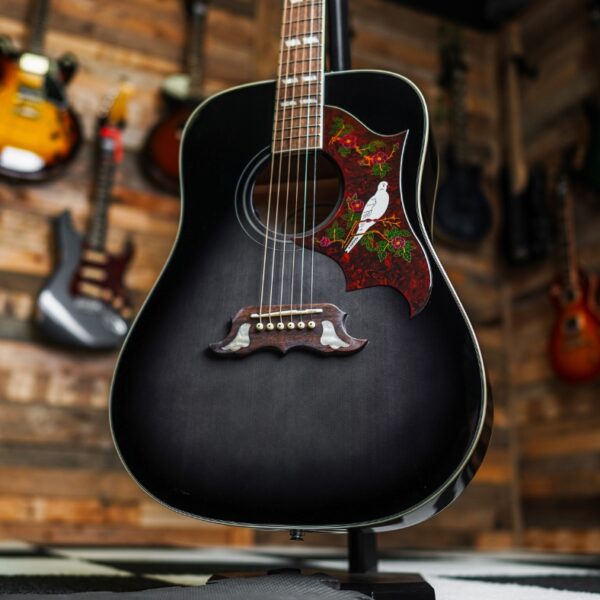 Epiphone Dove Studio in Transparent Ebony BurstOriginal price was: £1.99.£1.75Current price is: £1.75.Per Entry
Epiphone Dove Studio in Transparent Ebony BurstOriginal price was: £1.99.£1.75Current price is: £1.75.Per Entry -
Product on sale
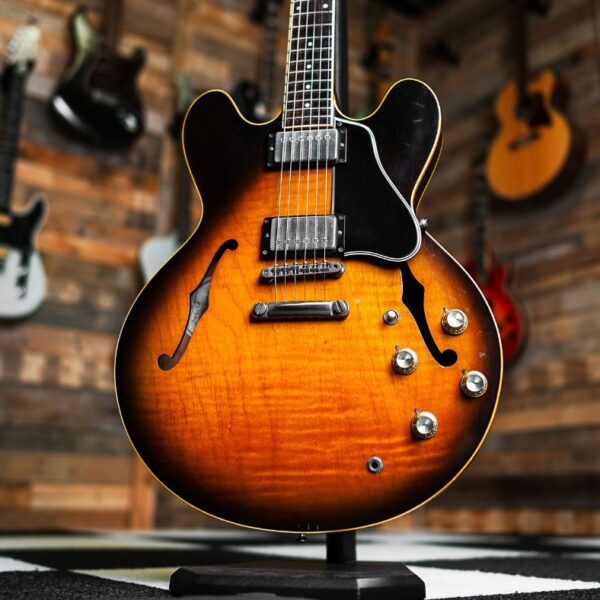 1992 Gibson ES-335 Dot in Vintage Sunburst – Yamano Import!Original price was: £2.99.£2.50Current price is: £2.50.Per Entry
1992 Gibson ES-335 Dot in Vintage Sunburst – Yamano Import!Original price was: £2.99.£2.50Current price is: £2.50.Per Entry -
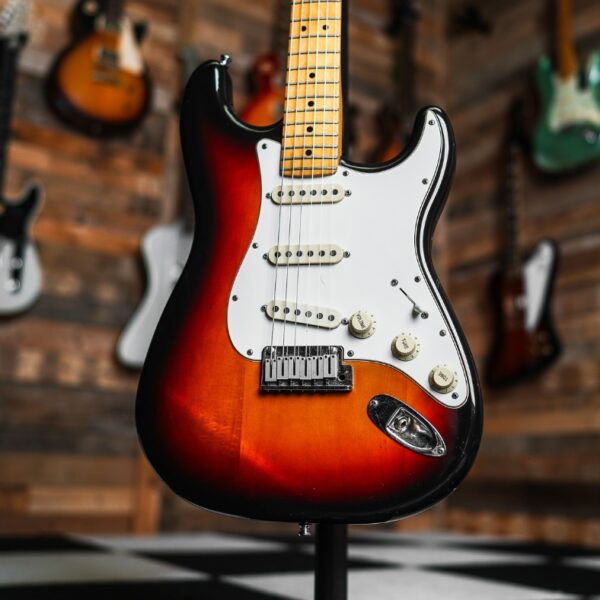 1987 Fender American Standard Stratocaster in 3-Tone Sunburst – B-Stock Bargain!£0.17Per Entry
1987 Fender American Standard Stratocaster in 3-Tone Sunburst – B-Stock Bargain!£0.17Per Entry -
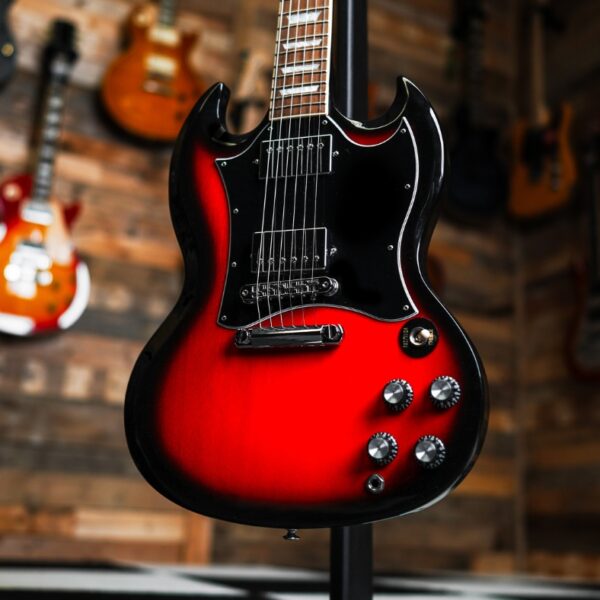 Gibson SG Standard Custom Colour in Cardinal Red Burst£0.30Per Entry
Gibson SG Standard Custom Colour in Cardinal Red Burst£0.30Per Entry -
 PRS SE CE24 in Slate Blue – Same-Day Delivery in The TGM Bus!£2.99Per Entry
PRS SE CE24 in Slate Blue – Same-Day Delivery in The TGM Bus!£2.99Per Entry -
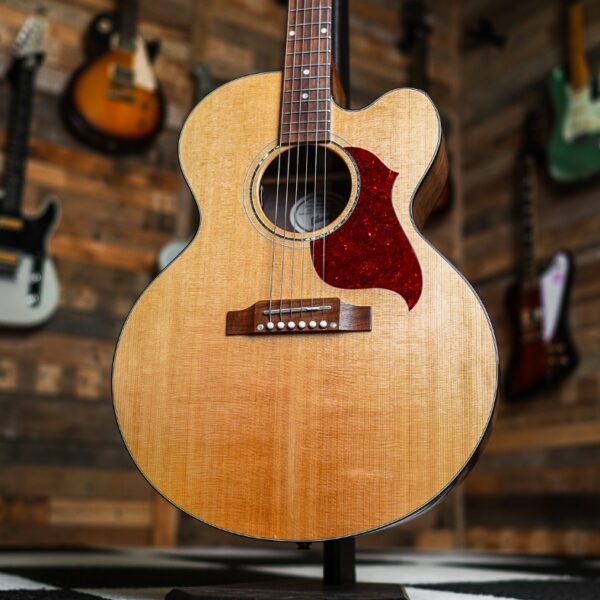 Gibson J-185 EC Modern Walnut in Antique Natural£2.99Per Entry
Gibson J-185 EC Modern Walnut in Antique Natural£2.99Per Entry -
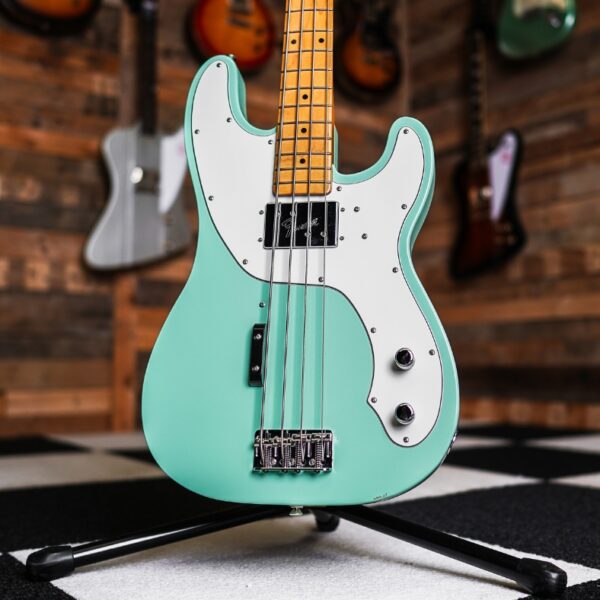 Fender Vintera II ’70s Telecaster Bass in Surf Green£0.15Per Entry
Fender Vintera II ’70s Telecaster Bass in Surf Green£0.15Per Entry -
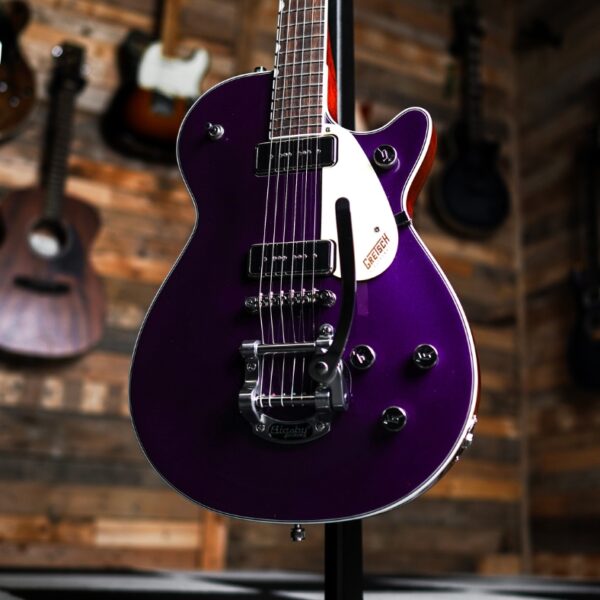 Gretsch G5210T-P90 Electromatic Jet Two 90 in Amethyst£1.99Per Entry
Gretsch G5210T-P90 Electromatic Jet Two 90 in Amethyst£1.99Per Entry -
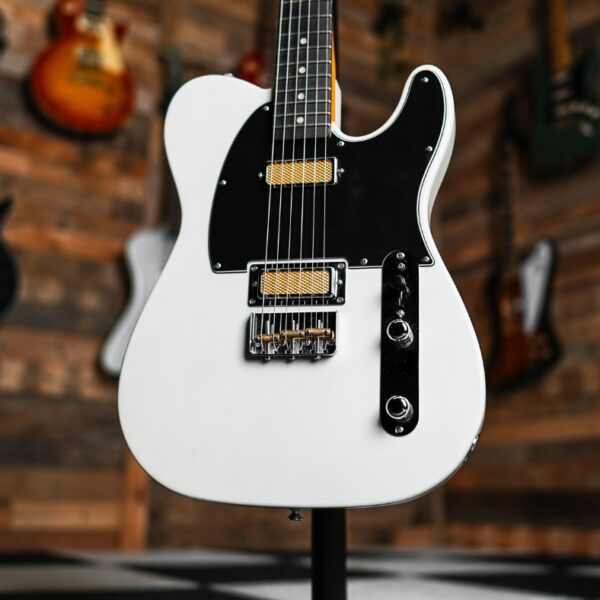 Fender Gold Foil Telecaster in White Blonde£0.13Per Entry
Fender Gold Foil Telecaster in White Blonde£0.13Per Entry

